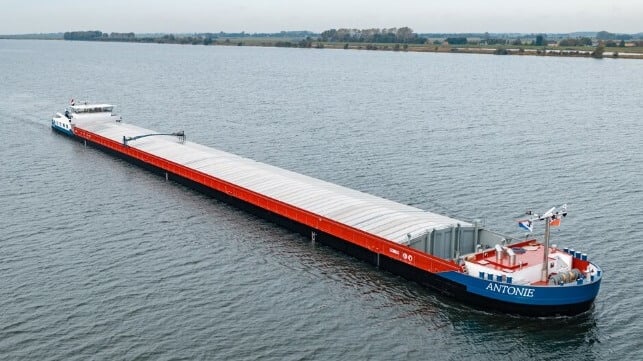First Newbuild Inland Hydrogen Cargo Vessel Prepares to Enter Service

The first newly built hydrogen-powered vessel is preparing to enter service as part of a demonstration program in the Netherlands designed to support the development of zero-emission shipping. Shipbuilder Concordia Damen reports the vessel recently completed technical sea trials and received a provisional certificate, while on Tuesday, Dutch King Willem-Alexander visited the vessel to mark its entry into service.
Named the Antonie, the vessel is approximately 443 feet in length with a cargo capacity of 3,700 tons and boasts a revolutionary fuel cell propulsion. The power from the hydrogen fuel cells will be converted to electricity to drive the vessel versus conventional inland shipping which relies on diesel fuel. Concordia Damen, which is leading the construction project for Dutch shipowner Lenten Scheepvaart reports the fuel cell has been installed on the ship. They expect the hydrogen containers to arrive and be installed by the end of the year, at which time the vessel will be ready to go into service.
The order for the ship was placed in 2021 as part of a project to demonstrate hydrogen-fueled propulsion. The government of the Netherlands provided a $4.9 million construction subsidy to Lenten Scheepvaart. Construction of the hull was completed in China at the Yizheng Yangzi Shipbuilding Co. (YZCB) where the vessel was launched late in 2022. It was loaded onto a heavy-lift vessel to be transported to the Concordia Damen shipyard where the installation of the propulsion system was completed along with the fitting of the deckhouse and outfitting.
The technical sea trails were completed on October 23 with a focus on testing the advanced diesel-electric propulsion system. Lloyd’s Register also inspected the vessel and issued a provisional certificate for it to enter service.
"The fuel cell will soon serve as an energy supplier for the battery packs after the installation of the distribution panel and the placement of the hydrogen containers,” explains Bart van Driel, project manager at Concordia Damen. “Once the distribution panel is delivered, it is just a matter of sizing and manufacturing the final pieces of piping and adjusting the fuel cell installation itself. The diesel generator will then no longer be used, so the Antonie will sail completely emission-free."
When the vessel enters service, it will operate under charter to Nobian, an industrial chemical company spun out from Nouryon (the former specialty chemical business of AkzoNobel), transporting salt from Delfzijl in the Netherlands to the Nobian plant in the Botlek. The company turns salt into chlor-alkali, among other things, with hydrogen as a residual product. The hydrogen produced in the chlor-alkali production process will be used as fuel for the Antonie.
With three hydrogen containers on board, the Antonie will have enough energy available for full zero-emission transport between Delfzijl-Rotterdam-Delfzijl. A hydrogen bunker station has also been built in Delfzijl.

King Willem-Alexander and the PM of the German state look on at the ceremony in Duisburg (Royal House on X)
The unique nature of the project was highlighted by King Willem-Alexander during his visit to the Antonie in Duisburg on November 14. The King met with Prime Minister Hendrik Wüst of the German state of North Rhine-Westphalia and toured hydrogen projects and the port of Duisburg, which is preparing to become a transshipment point for clean energy forms. Several cooperation agreements were signed during the visit to the port including for connection of national hydrogen pipeline networks and the Delta Rhine Corridor. During the event, the King and Prime Minister highlighted that the aim is for ten inland vessels and at least four hydrogen filling stations to support operations between Rotterdam, Duisburg, and Cologne by 2026.

that matters most
Get the latest maritime news delivered to your inbox daily.
In addition to the Antonie, several projects are converting existing vessels in the Netherlands and the Benelux region to hydrogen. The port of Rotterdam is also working with Damen and others in the development of hydrogen and the infrastructure at the port to support it as an alternative fuel.
Earlier this year, the retrofit to install hydrogen fuel cells on the first inland containership was completed in the Netherlands. Compagnie Maritime Belgique (CMB) launched the first hydrogen-powered crew transfer vessel in 2022 and the Port of Antwerp is currently preparing for the introduction of a hydrogen-fueled tugboat.
